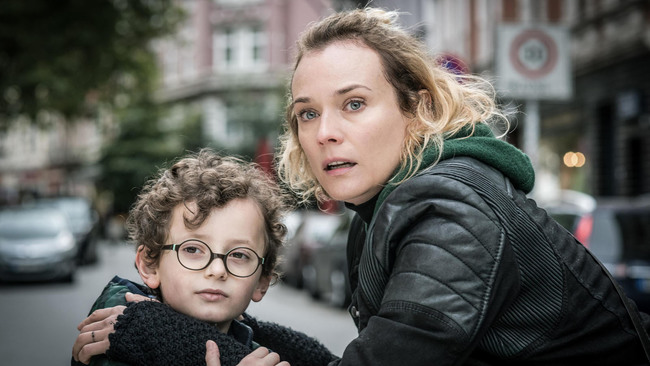Cannes 2017: Fatih Akin’s In the Fade

Today’s second Competition entry is Fatih Akin’s In the Fade, and we begin with the A.V. Club’s A. A. Dowd: “Diane Kruger stars as Katja, a woman whose husband, a Turkish immigrant, and son, who’s only six, are killed in a terrorist bombing. The likely culprits: Clean-cut neo-Nazi scumbags.” Akin “divides the story into three chapters, each a movie you’ve seen before: the gauntlet of grief; the courtroom battle; the moral conundrum of vengeance. It’s all watchable, but in the way of a rainy Saturday afternoon Law & Order marathon, even with Kruger wrestling to invest scenes of her snorting and free-basing her pain away with emotional authenticity.”
“For good or bad, Akin has to grapple with the fact that everyone continues to compare his recent films with Head-On, one of those rare, hip crossover movies with appeal to critics and general audiences alike,” writes Jay Weissberg for Variety. “Given the theme and Kruger’s incandescence, In the Fade may do better business, and Rainer Klausmann’s confidently fluid camerawork just gets better and better, yet Akin’s script, co-written like last year’s Goodbye Berlin [Tschick] with Hark Bohm, keeps numerous side characters as half-drawn caricatures and then, toward the very end, makes several poor choices.”
“The trial is compelling enough, even if this section is light on proper scrutiny,” grants Time Out’s Dave Calhoun, “and then we’re off to Greece for a final episode of revenge (involving that country’s far-right Golden Dawn party) which is extremely hard to swallow and borderline vacuous. Akin’s style is unflashy realism, which only throws a spotlight on the film's pile-up of unconvincing, didactic story turns. Starting in a place of in-the-moment realism, this increasingly plays out as wish-fulfillment and finally leaves reality behind entirely.”
The Guardian’s Peter Bradshaw finds it all “frankly uncompelling. Kruger herself does her best, but it is not a particularly good performance, though there is little or nothing for her to work with in writing or direction. The action builds to a truly ridiculous compromise that should have been thrown out at the script development stage. This is not Kruger’s finest hour. Nor Akin’s either.”
The Hollywood Reporter’s Deborah Young disagrees: “While the politically-charged story will awaken outrage at the hate crimes it realistically portrays, what really brings the horror home is a superb Diane Kruger as a hard-drinking user of recreational drugs, proudly tattooed and unapologetic for her life outside the norms. Acting in her native German language, she delivers a career-high performance as the courageous, emotional and unforgiving survivor Katja that should easily put her in the running for an acting prize at Cannes.”
“Kruger’s performance, although not wholly consistent, is of the awards-friendly, bared nerve endings variety,” finds Wendy Ide in Screen. “Even so, the story is riddled with questionable plot devices, not least the decision to have Katja score drugs from her attorney and do a load of coke at a moment of unimaginable stress.”
More from John Bleasdale (CineVue, 3/5) and Fabien Lemercier (Cineuropa).
“A couple of years ago there was a list, a website called Nuremburg 2.0, and they listed politicians, artists,” Akin tells Variety’s Alissa Simon. “My name was on the list as a target for neo-Nazis. That’s what drove me to write it and shoot it because I am a possible target for these groups. What I did with this film was kind of like a strike back.” Akin also talks to Birgit Heidsiek at Cineuropa.
Updates, 5/27: “I’ve had a complex relationship with this director’s work over the years,” writes Bilge Ebiri, dispatching back to the Village Voice. “As a fellow member of the Turkish diaspora, I sometimes find he totally nails the perspective of the insider-outsider, of the out-of-body experience of belonging to different worlds, even in stories that aren’t ostensibly about Turks. But he can also veer headlong into the simplistic and cliché, and his flops can be mighty. In the Fade, at some points, seemed to be edging toward one of those latter cases, but a second viewing could be key—the more I think about it, the more I believe it might actually be one of Akin’s best.”
“Akin has done a bit of course-correcting in all the right ways,” finds Tommaso Tocci at the International Cinephile Society. “[H]is newest film is a compact, efficient three-part thriller morphing swiftly from an exploration of traumatic, violent loss into a clear-eyed courtroom drama, with a revenge-tinted undercurrent moving silently beneath the surface.”
“The courtroom sequences are spare but gripping, with especially dynamic performances by the two opposing attorneys (Denis Moschitto and Johannes Krisch),” writes Barbara Scharres at RogerEbert.com. “The bookending drama, including the film’s final section in which Katja considers taking matters into her own hands, feels perfunctory, a cautionary exercise rather than a story with heart.”
“In the Fade, try as it might to be some kind of deep character study and tap into the theme of justice, is a flatline of a film,” declares Nikola Grozdanovic at the Playlist.
Update, 5/28: “In the Fade has a few things to say about contemporary life in Germany, but it is, in essence, an entertainment—albeit one obsessed with the morals of revenge,” writes Rory O’Connor at the Film Stage.
Update, 5/31: For Vulture’s Jada Yuan, “much of Kruger’s remarkable portrait of love and grief is wordless, with the power to transcend both subtitles and national boundaries. Everything you need to know is in her face, as her character moves through horror, depression, and anger before turning, in desperation, to vengeance, as she tries to go on living through unimaginable loss.”
Cannes 2017 Index. For news and items of interest throughout the day, every day, follow @CriterionDaily.



